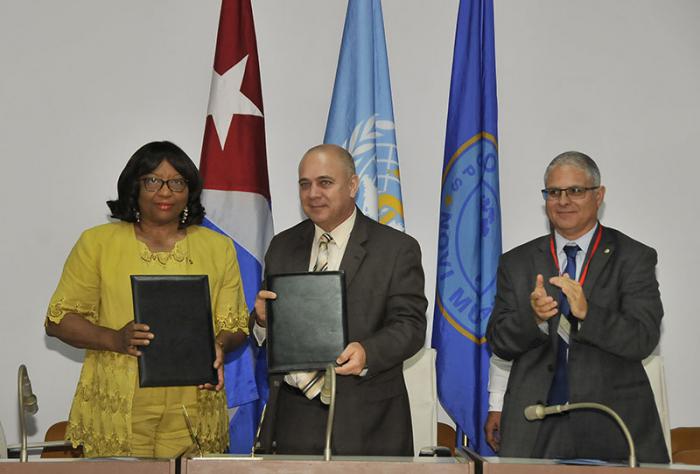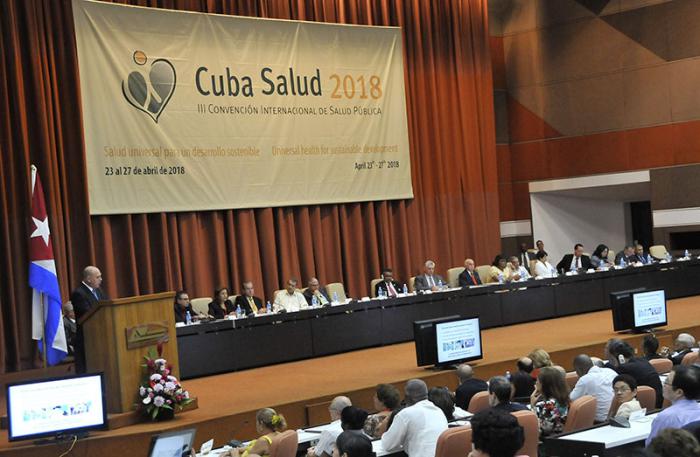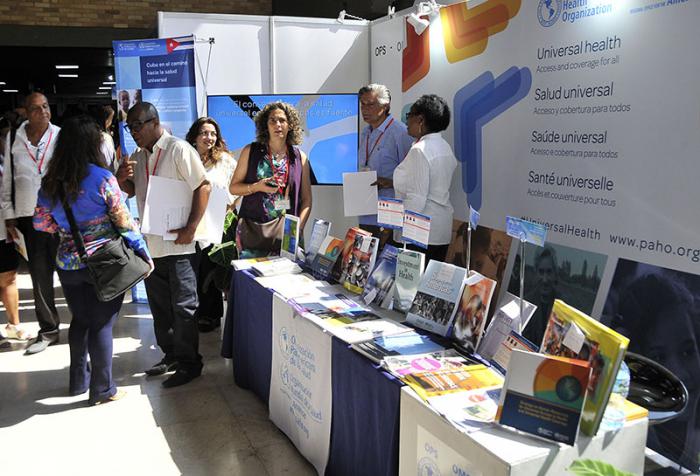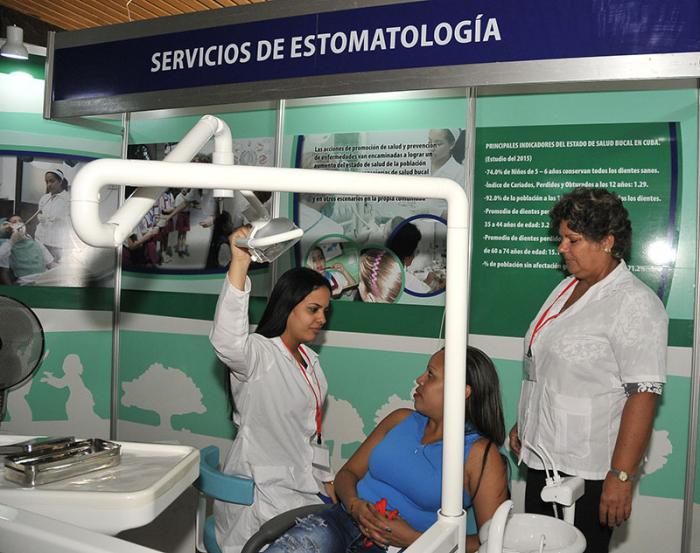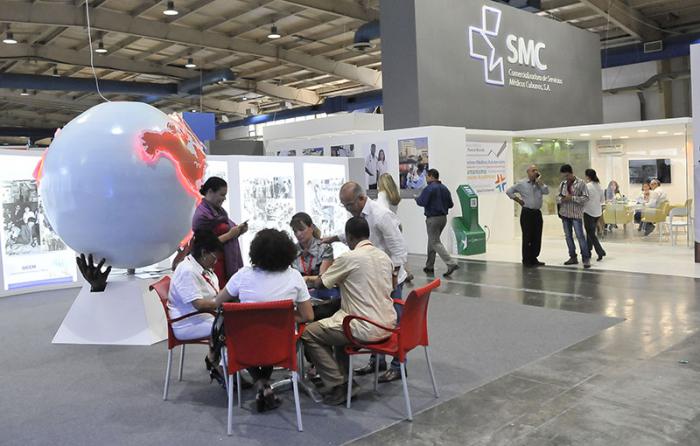The implementation of the Strategy for Universal Access to Health and Universal Health Coverage, signed 40 years ago in the city of Alma-Ata, Kazakhstan, was the focus of debates during the 3rd Cuba-Health International Convention 2018, which took place at Havana’s International Conference Center, April 23-27, with the presence of 2,865 delegates from 93 countries.
“Health is a human right that everyone should benefit from. Even so, more than half of the world’s population lacks medical services. Millions of human beings are forced to live in poverty, due to the costs demanded for their care,” stated WHO Director-General Dr. Tedros Adhanom Ghebreyesus, during the event.
However, he recognized that Cuba offers a model of a free and inclusive health system for its entire population. He thanked the President of the Councils of State and Ministers, Miguel Díaz-Canel Bermúdez, who attended the inaugural session and with whom he held a cordial dialogue.
Dr. Adhanom Ghebreyesus, from Ethiopia and leading WHO since last year, stated during a press conference that Cuba is the perfect place to learn how to achieve universal coverage, even with limited resources.
He referred to several of Cuba’s achievements in 2017: an average life expectancy at birth of 78.45 years; infant mortality of 4.0 per 1,000 live births; the disappearance of 11 vaccine preventable diseases, and having certified (in 2015) the elimination of mother-to-child transmission of HIV and syphilis.
Dr. Ghebreyesus also pointed out that this is not the first time he has traveled to the Caribbean nation, where he discovers something new on each visit, be it in terms of health care, scientific research, drug development, or vaccination. “The island has more than 160 patents for its medicines, it produces eight of the 13 vaccines provided children, and is always open to cooperate in the international arena,” he told reporters.
He also highlighted Cuba’s preparations to respond to emergencies and epidemic outbreaks, the presence of 50,000 of its health personnel in 64 nations, the training of human resources in different medical specialties, nursing and health technology, and the graduation on the island of more than 28,500 young people from some 100 countries in these professions.
To achieve such results, he noted, requires the political will and consistent and systematic commitment of the state.
Dr. Carissa F. Etienne, director of the Pan American Health Organization (PAHO), also participating in the international event in Havana, expressed similar views.
In a keynote address, she explained that the values of Cuba’s health system are linked to those promoted by PAHO, including solidarity, equity, and the right of the population to receive medical care, as pledged in September 1978 at the International Conference on Primary Health Care, in Alma-Ata, Kazakhstan.
She added that although several countries of the continent have made progress in the sector, issues such as geographical location and institutional, material, and financial scarcities continue to pose problems. “More than a third of the inhabitants of this region do not have access to comprehensive health services. In the years 2013 and 2014 there were more than 1.2 million deaths that could have been avoided, if health systems had offered accessible, quality services,” she stressed.
Dr. Etienne also highlighted Cuba’s innovative means of solving objective problems, such as the lack of material and financial resources, despite being a poor nation. She noted that the island’s health system prioritizes primary health care, starting with individuals, their families, and communities, based on integrated networks to reach every corner of the island, and ensure the availability of comprehensive quality services.
PAHO AND WHO: STRATEGIC ALLIES OF CUBA
Dr. Etienne praised the close ties between PAHO and Cuba, ever since the emergence of the regional organization, on signing the Country Cooperation Strategy to be implemented from 2018 through 2022, in which five goals are set: more health, more efficiency, more intersectoriality, more resilience in the face of climate change, and more participation in global health.
“I am sure that these priorities will serve as guides for our technical collaboration to materialize where it is most needed and has the greatest impact. Also where it allows for the achievement of greater results. It is a great privilege for WHO and PAHO to work with this country,” she commented after signing the agreement.
Néstor Maremon, director of International Relations at the Ministry of Public Health (MINSAP), noted in an interview with Granma International, that joint work was previously conducted in order to identify the issues outlined in the strategy, which could become specific projects and cooperation tasks during the four-year period.
"It’s about ordering the priorities on which we will cooperate, in accordance with the needs of our health system, because these international organizations accompany us permanently in the development of the main programs, essentially in training and advising. Our great medical and professional force also helps other countries to fight diseases and epidemics," he said.
Meanwhile, Roberto Morales Ojeda, a member of the Party Political Bureau and Minister of Public Health, described the positive increase in joint efforts with these institutions.
“We are encouraged by the results achieved, but without a doubt, this new moment in which we are proposing to work in five areas that illustrate the objectives defined at a global level, will undoubtedly allow us to consolidate this work in the next four-year period,” stated Ojeda, also a vice president of the Council of State.
The Minister highlighted the fruitful bilateral ties with both international organizations, and emphasized that such agreements lead to the improvement of the Cuban people's health and the quality of services.
He further discussed this theme in his opening remarks for the International Convention, during which he stressed the responsibility of health systems in curing diseases and ensuring that people live healthily and with dignity.
“Today, the threats to world peace, wars, scarcity of food and water, depletion of energy sources, and climate change, make this planet an insecure place and will determine the perpetuity of the human species,” he concluded, after offering an exhaustive account of the history of Cuban public health.
The Cuban Health Minister explained that, in the last four decades, the Declaration of Alma-Ata has been the central focus guiding Cuban policies to ensure health for all. This means ensuring universal coverage, which implies non-discriminatory access of individuals and their families to adequate, timely, and specific comprehensive services at the national level, as well as quality, effective, and affordable medicines.
To guarantee this accessibility, the island has a total of 451 polyclinics, 10,869 family doctor’s offices, 110 dentistry clinics, 151 hospitals, 131 maternity homes, 287 older adult centers, and 150 retirement homes, among other institutions, for a population of 11,200,000 inhabitants.
The budget allocated to this sector and to social assistance represents 27% of the total state budget and 11% of Gross Domestic Product. Cuba now has one doctor for every 122 inhabitants, one dentist for every 602 people, and one nurse for every 128, reaching figures higher than those of First World countries.
CUBA HOSTS VACCINATION WEEK IN THE AMERICAS
The International Convention also served as a platform to launch the 16th Vaccination Week in the Americas - in Cuba for the first time. The regional immunization campaign, led by PAHO since 2003, has benefited 720 million people in the continent, vaccinated against more than a dozen dangerous diseases.
During the opening ceremony, held at the Victoria de Girón Institute of Basic and Preclinical Sciences in the Cuban capital, it was noted that, to date, Cuba has eliminated diseases such as polio, neonatal tetanus, diphtheria, measles, rubella, and congenital rubella syndrome, among others.
This year, the Week saw 70 million people vaccinated, while vaccinations against measles were reinforced in 11 countries, following the appearance of more than 380 cases and outbreaks in the first months of the year.
In addition, 14 nations also vaccinated against influenza, 16 against polio, 13 against human papillomavirus (HPV), and five against yellow fever.
The extensive vaccination campaign also saw a range of other activities planned in 16 countries, such as the distribution of Vitamin A and deworming efforts.
As a PAHO press release noted, “It is estimated that increasing access to vaccination in low and middle-income countries by 2030 would prevent 24 million people from experiencing poverty due to healthcare-related costs.
“Vaccination saves around three million lives each year from diseases such as measles, whooping cough and diarrhea, and more children are now being vaccinated than ever before.”
Through the Center for Genetic Engineering and Biotechnology (CIGB), Cuba provides high quality and affordable vaccines to 44 countries.
HEALTH FOR ALL TRADE FAIR
Running parallel to the Convention was with the 14th Health for All Trade Fair 2018, also attended by WHO Director-General Dr. Tedros Adhanom Ghebreyesus, and PAHO Director Dr. Carissa Etienne. The Fair, held at the Pabexpo fairgrounds in the Cuban capital, provided space to present and learn about medicines, equipment, and medical technologies.
Participating in this year’s edition were 190 companies from 32 nations, of which 139 were from abroad. The Fair also included 89 talks by specialists from some 30 foreign firms and leading Cuban scientists.
In addition to strictly commercial activities, there were meetings between academics and scientists, as part of the First Health for All Investment Forum 2018, that permitted the sharing of ideas on the challenges of attracting foreign capital, and achieving collaborative alliances and co-development.
Granma International approached the stand of German firm Ottobock, specializing in prosthetics. Representatives referred to the strategic alliance established with Cuba, based on the strength of a free and inclusive system and the knowledge and accumulated experience of sector professionals, which helps to rapidly advance toward higher goals.
Thomas Pfleghar, a prosthetics technician of the German firm, explained that since last year, Cubans have benefited from prosthesis produced by the company under a scientific project entitled “Cuba in Motion,” which serves as a model for the introduction of this technology across the country.
The regional representative of the firm, Argentine Marcelo Cuscuna, noted that already 20 patients are expected to receive made-to-order prosthesis, supplied through the MediCuba enterprise.
Meanwhile, engineer Hector E. Corcho Morales, Ottobock branch manager in Cuba, explained that the Havana headquarters was established in 2016, and thanks to the Cuba in Motion project, more than 60 technicians from the country have already been trained. The second stage includes the modernization of seven laboratories in several provinces to produce these prostheses on the island.
Exhibiting an Air Incui basic incubator was Atom Medical Corp. of Japan. The device is designed to be used in newborn care to control oxygen concentration and temperature variability, as well as record body weight with the minimum manipulation of the infant, according to Colombian biomedical engineer Gilbert Andrey López, regional representative of the Japanese company.
“Our brand has been present in Cuba for 50 years, with equipment installed in its hospitals. Many of the visitors to the Fair have approached the stand and tell us that in their medical institutions there are still incubators sold several decades ago, which is why they need investments to modernize them. They ask us for information on special equipment for neonatal surgery and cardiovascular interventions, which has generated consultation contacts.”
Meanwhile, the Argentine María José Bianco, representing German company Fresenius Medical Care, a world leader in hemodialysis treatments and exhibiting several artificial kidneys, praised the partnership established with Cuban import enterprise MediCuba, which has facilitated compliance with national regulations.
“This joint work facilitates meetings with professionals from the scientific, technical, and commercial areas, so that they can assimilate our technologies in the areas of hemodialysis and peritoneal dialysis. This has permitted a fruitful exchange, growth for the firm, as well as a better quality of the products sold and services for patients,” Bianco stressed.
Several further events were held as part of the Convention and the Trade Fair, including the Hygiene and Epidemiology Congress, and the Computer Science and Human Resources Training congresses, including symposia, panels, and lectures. The workshop on Organization, Quality, and Efficiency in Health Systems and Services stood out as part of these activities, as it covered the process of transformation of the sector, with notable interest from many international delegates in learning about the Cuban experience in this field.


